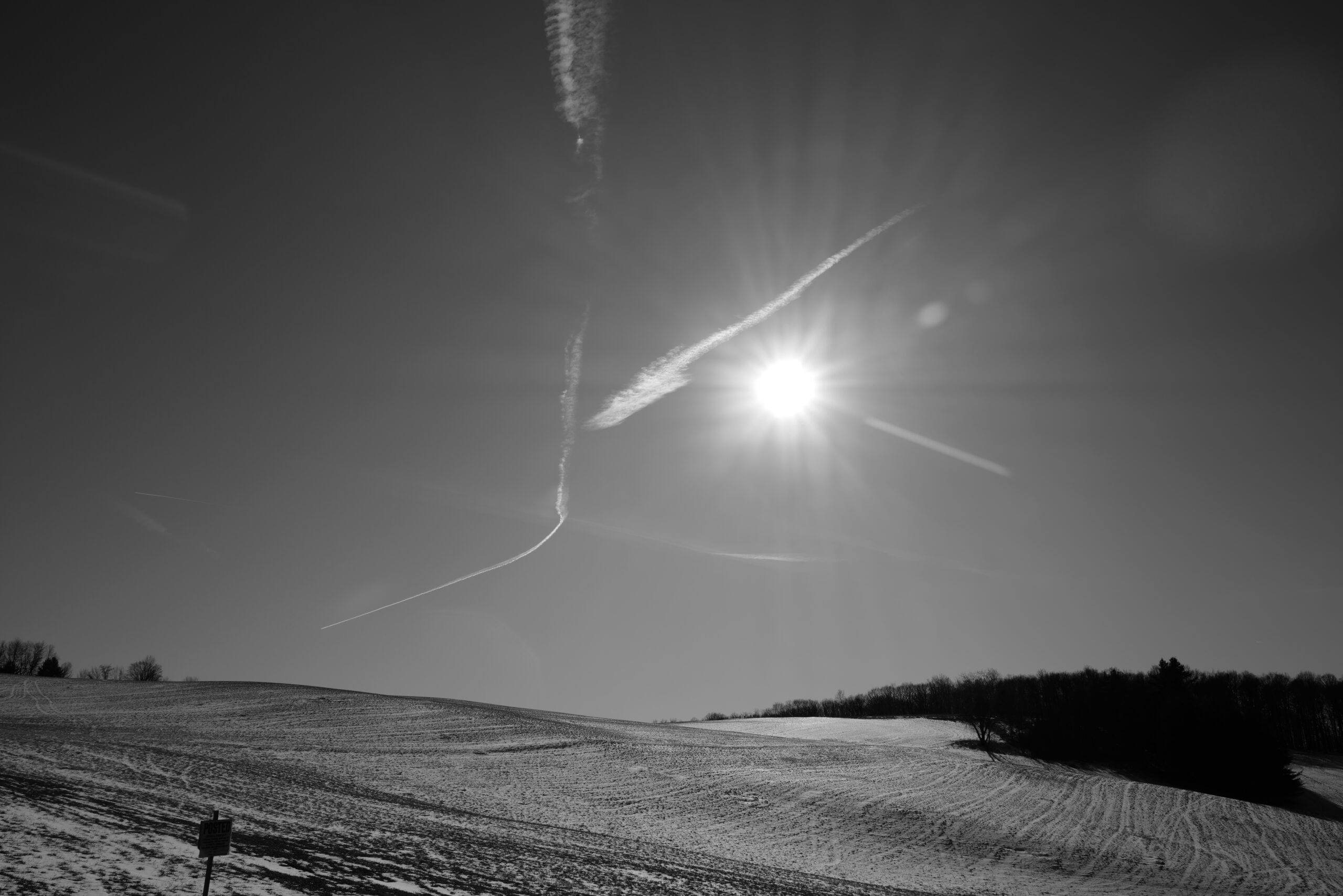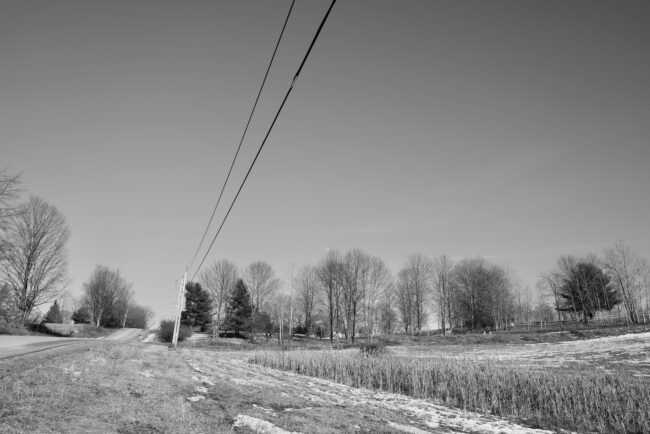The country I live in is not paradise, any more than most cities are. Most people get along, but some don’t. Cliques, social differences, poverty, anger, and political disagreements exist. But there is also great sweetness and connection.
I came because I wanted to be closer to nature and animals, and I felt uncomfortable with the coldness of cities.
Community still lives here. When there is trouble, somebody always sees, and everybody comes.
I live in a small town, a village on the Vermont border southwest of Manchester, Vt, and an hour away from Albany, New York. There are no box stories or highways here. The old mansions are mostly apartments now or used as homes for religious groups.
For years, I have wandered all over this area on lonely, sometimes scary country roads, looking for photos, including the one above I took as a jet-straked across the blue sky in front of the falling sun.
There is some movement from city people who fled here after the pandemic, but it is still an agricultural area, impoverished and struggling. These are the people time and the federal government forgot.
It’s a ritual for me, this picture-taking. I do it almost every day of my life, no matter where I am going. I am always looking up and around, hoping to see a picture. If I do, I turn on my blinkers, pull over, step out of the car, take my camera out of the bag, and step carefully out.
More than once, and especially at night, I’ve nearly been clipped by cars and trucks who don’t see me and come speeding by. A dog is always sitting behind me; these days, it’s Zinnia.
As I get older, I am more careful of ditches, snow piles, and mud; it’s easy to stumble while holding a camera up to the sky. I have the torn jeans to prove it. I’ve never fallen on a camera.
I’ve been doing this almost every day and many nights for over a decade, ever since I moved here.
It is the most wonderful place to be a photographer; it’s so beautiful. I never come home without a picture.
Many of the farmers have come to know me. At first, when I pulled over around their properties, some would come out with a rifle, sure I was coming from the state to raise their assessments or taxes. Now, when they see me, they wave and sometimes laugh.
They think I’m crazy but not a threat. One said he admired my determination.
But here’s the point of this rumination. In all of those many hundreds, even thousands of stops, except when there was no traffic at all, every single time I stopped, a car or truck pulled over alongside me and rolled down a window.
It always goes the same way.
I look up and see a face in the driver’s seat. “You OK?” they say. They always say the same thing, male or female, and women are as willing to stop as men.
Yes, I shout back, giving them a thumbs up. They nod, give me a thumb back, and drive off. If it is raining or snowing, which it often is, they shake their heads in wonder and then drive off. People out here don’t walk in the rain as a rule.
When I’m pointing at the camera, I hear the sounds of cars coming close and wait for the shout: “You okay, mister? You ok, buddy?
They never ask me who I am, what I am doing there, my politics, or my religion. They do what country people do in a remote, sparsely populated town. They check on someone likely to be a neighbor or a fellow resident. I can’t be mistaken for a country born. I’ll never be a local.
I’m a city boy. It doesn’t matter.
Community matters here; it has never died; it survives and transcends the hatred and argument sweeping the nation and even my town at times. I don’t know any of these men or women; they don’t know me as a rule, although more and more seem to recognize me or figure out who I am.
When I had an accident in New Jersey once, I waited in my car for an hour as thousands of cars thundered by until a surly state police trooper came by to answer my call for help.
Four years ago, when my car slid off the road and almost slid into a watery ravine, and I couldn’t open the door, it took three or four minutes before four or five faces appeared in the window.
They had pulled over, rushed down the icy hill, yanked me out of the car (inches from the watery ravine), made sure I was all right, waited for the police, wrapped me in blankets, and disappeared as soon as the police arrived.
I do recall all these Trump caps in the window. All the trucks lined up in the run; they appeared out of nowhere.
I never knew who any of them were, and none of them knew me as far as I know. I never got to thank them; to my knowledge, I never saw them again.
I’ll always remember it.
This place is not perfect. But I can’t help but love it. It makes it sweet. I have never regretted moving here. Somehow, it’s where I belong.



Beautiful rumination on the disappearing ideal of human decency and care for our fellow citizens. It used to be called neighborliness . Glad to know it still exists where you are. Can’t say I witness many examples of it where I am. We are living in a time when empathy and kindliness are in decreasing supply.
I love my small town. I used to live in bigger cities, then I moved to this town of 6,000 people 24 years ago. I was certain it was a cultural wasteland, until I went to the local library, and met the most wonderful people. There I met fellow book lovers and community-minded people, who helped me find my place in this town, along with ways I could be involved. When I broke my ankle a few years ago, our front door was revolving with people coming to help with food, rides and companionship. I don’t think that could have happened in a big city. A sense of community is what is missing in the world because a community shares its gains and losses. Humans as herd animals need each other in order to survive and thrive. Rugged individualism doesn’t move anyone or anything forward.
I’m one that stops to check on folks stopped. Here in rural northern Wyoming, it’s just the right thing to do.
I love your ruminations on country life and your photos. We moved from a bustling suburb of Chicago to Galway, NY, seventeen years ago for similar reasons. Love it here! I am also never without my camera as I go about my day. So many old barns and abandoned farmhouses where we are. If only their walls could talk. I just bear witness with my photos.
Nice!
On a visit to India years ago, busy looking at the Taj Mahal, I fell and broke my camera. I could still take photos just had trouble focusing. I took my lens to a camera shop and when the owner opened it, I was amazed at how many metal pieces were inside. I didn’t have time to leave it for repair as a part had to be ordered. Luckily, I had a little point and shoot with me. People there in India loved having their photo taken and children would say, “Take my photo!”. Mine was taken to as I looked so different from them with my then red hair.
thanks jon/maria
A kind wave from south of you in Pownal. Same spirit abides around here.